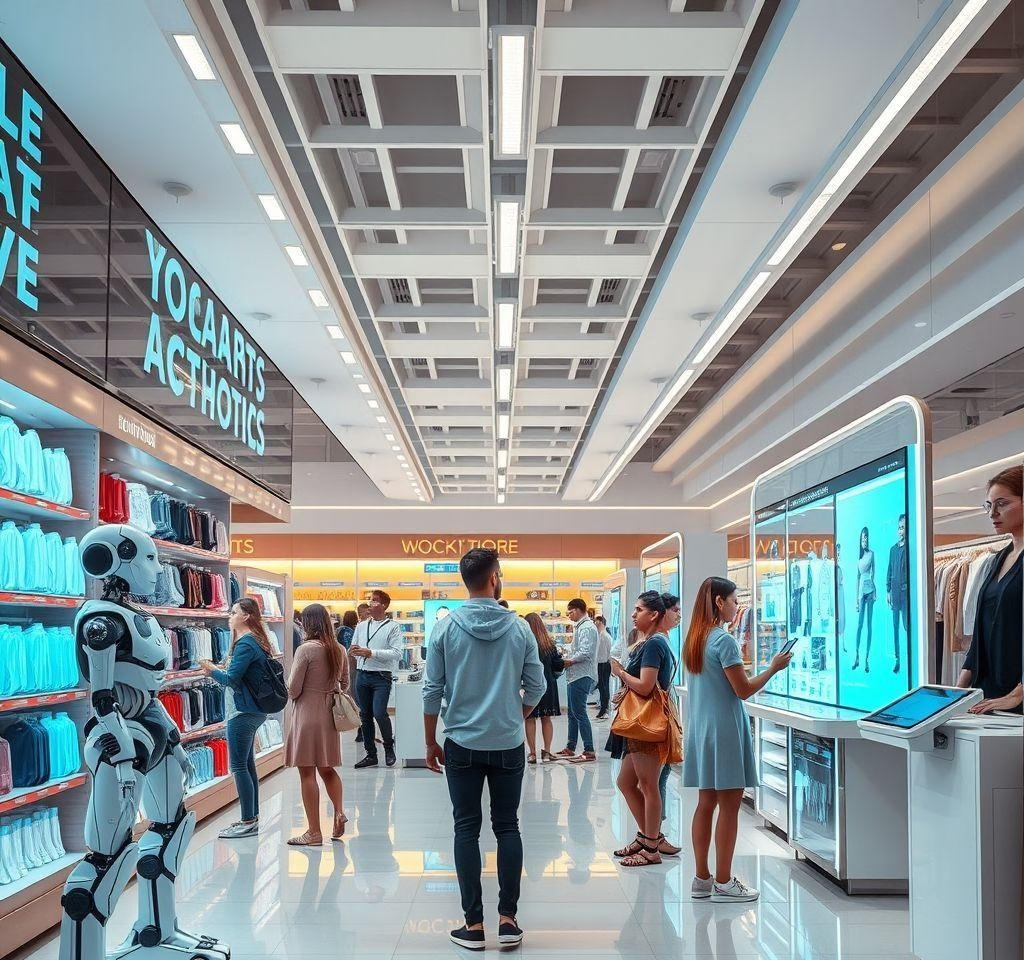Smart Retail: How AI is Transforming the Future of Shopping
Artificial intelligence is no longer optional for retailers aiming to survive in the digital age. This article explores how AI-driven innovations are reshaping inventory management, customer experiences, and operational efficiency while addressing ethical imperatives.
The Inventory Revolution: AI-Driven Demand Forecasting
The Inventory Revolution: AI-Driven Demand Forecasting
AI is transforming inventory management. Real-time demand forecasting, powered by AI, allows retailers to optimize stock levels. This minimizes waste and maximizes profitability. Dynamic pricing, another AI application, adjusts prices based on real-time demand and market conditions. This optimizes revenue and reduces markdowns. AI algorithms analyze sales data, weather patterns, and even social media trends to accurately predict demand. This precision reduces both overstocking and stockouts.
Major retailers are already using AI-driven systems. For example, Amazon employs sophisticated AI systems to forecast demand. Walmart utilizes AI to streamline its supply chain. Their AI systems analyze vast amounts of data. This allows them to predict fluctuations in demand with impressive accuracy. By implementing AI-powered inventory management, these retailers reduce waste and improve efficiency. They improve customer experience by consistently having the right products in stock at the right time.
Personalization at Scale
The Inventory Revolution: AI-Driven Demand Forecasting
AI is transforming inventory management. Real-time demand forecasting, powered by AI, allows retailers to optimize stock levels. This minimizes waste and maximizes profitability. Dynamic pricing, another AI application, adjusts prices based on real-time demand and market conditions. This optimizes revenue and reduces markdowns. AI algorithms analyze sales data, weather patterns, and even social media trends to accurately predict demand. This precision reduces both overstocking and stockouts.
Major retailers are already using AI-driven systems. For example, Amazon employs sophisticated AI systems to forecast demand. Walmart utilizes AI to streamline its supply chain. Their AI systems analyze vast amounts of data. This allows them to predict fluctuations in demand with impressive accuracy. By implementing AI-powered inventory management, these retailers reduce waste and improve efficiency. They improve customer experience by consistently having the right products in stock at the right time.
Predictive Analytics: The New Crystal Ball
The Inventory Revolution: AI-Driven Demand Forecasting
AI is transforming inventory management. Real-time demand forecasting, powered by AI, allows retailers to optimize stock levels. This minimizes waste and maximizes profitability. Dynamic pricing, another AI application, adjusts prices based on real-time demand and market conditions. This optimizes revenue and reduces markdowns. AI algorithms analyze sales data, weather patterns, and even social media trends to accurately predict demand. This precision reduces both overstocking and stockouts.
Major retailers are already using AI-driven systems. For example, Amazon employs sophisticated AI systems to forecast demand. Walmart utilizes AI to streamline its supply chain. Their AI systems analyze vast amounts of data. This allows them to predict fluctuations in demand with impressive accuracy. By implementing AI-powered inventory management, these retailers reduce waste and improve efficiency. They improve customer experience by consistently having the right products in stock at the right time.
Automating the Store of Tomorrow
The Inventory Revolution: AI-Driven Demand Forecasting
AI is transforming inventory management. Real-time demand forecasting, powered by AI, allows retailers to optimize stock levels. This minimizes waste and maximizes profitability. Dynamic pricing, another AI application, adjusts prices based on real-time demand and market conditions. This optimizes revenue and reduces markdowns. AI algorithms analyze sales data, weather patterns, and even social media trends to accurately predict demand. This precision reduces both overstocking and stockouts.
Major retailers are already using AI-driven systems. For example, Amazon employs sophisticated AI systems to forecast demand. Walmart utilizes AI to streamline its supply chain. Their AI systems analyze vast amounts of data. This allows them to predict fluctuations in demand with impressive accuracy. By implementing AI-powered inventory management, these retailers reduce waste and improve efficiency. They improve customer experience by consistently having the right products in stock at the right time.
Ethical Considerations and the Future
The Inventory Revolution: AI-Driven Demand Forecasting
AI is transforming inventory management. Real-time demand forecasting, powered by AI, allows retailers to optimize stock levels. This minimizes waste and maximizes profitability. Dynamic pricing, another AI application, adjusts prices based on real-time demand and market conditions. This optimizes revenue and reduces markdowns. AI algorithms analyze sales data, weather patterns, and even social media trends to accurately predict demand. This precision reduces both overstocking and stockouts.
Major retailers are already using AI-driven systems. For example, Amazon employs sophisticated AI systems to forecast demand. Walmart utilizes AI to streamline its supply chain. Their AI systems analyze vast amounts of data. This allows them to predict fluctuations in demand with impressive accuracy. By implementing AI-powered inventory management, these retailers reduce waste and improve efficiency. They improve customer experience by consistently having the right products in stock at the right time.
The Inventory Revolution: AI-Driven Demand Forecasting
Personalization at Scale: AI’s Role in Retail
AI is revolutionizing the retail landscape. Hyper-personalized marketing campaigns are now possible. AI analyzes customer data to create targeted promotions. Recommendation engines, powered by AI, suggest relevant items. This increases customer engagement and sales.
Dynamic pricing strategies leverage AI to optimize pricing. Prices adjust based on demand, competition, and customer behavior. This maximizes revenue and profitability. AI-driven personalization fosters customer loyalty. It creates more positive shopping experiences. This leads to increased customer retention and revenue growth.
Many retailers are already seeing success. AI-powered personalization increases customer lifetime value. It drives sales and strengthens brand loyalty. The ability to deliver tailored experiences at scale is a game-changer for the retail industry. AI is essential for staying competitive in the modern marketplace.
Personalization at Scale
Personalization at Scale: AI’s Role in Retail
AI is revolutionizing the retail landscape. Hyper-personalized marketing campaigns are now possible. AI analyzes customer data to create targeted promotions. Recommendation engines, powered by AI, suggest relevant items. This increases customer engagement and sales.
Dynamic pricing strategies leverage AI to optimize pricing. Prices adjust based on demand, competition, and customer behavior. This maximizes revenue and profitability. AI-driven personalization fosters customer loyalty. It creates more positive shopping experiences. This leads to increased customer retention and revenue growth.
Many retailers are already seeing success. AI-powered personalization increases customer lifetime value. It drives sales and strengthens brand loyalty. The ability to deliver tailored experiences at scale is a game-changer for the retail industry. AI is essential for staying competitive in the modern marketplace.
Predictive Analytics: The New Crystal Ball
Personalization at Scale: AI’s Role in Retail
AI is revolutionizing the retail landscape. Hyper-personalized marketing campaigns are now possible. AI analyzes customer data to create targeted promotions. Recommendation engines, powered by AI, suggest relevant items. This increases customer engagement and sales.
Dynamic pricing strategies leverage AI to optimize pricing. Prices adjust based on demand, competition, and customer behavior. This maximizes revenue and profitability. AI-driven personalization fosters customer loyalty. It creates more positive shopping experiences. This leads to increased customer retention and revenue growth.
Many retailers are already seeing success. AI-powered personalization increases customer lifetime value. It drives sales and strengthens brand loyalty. The ability to deliver tailored experiences at scale is a game-changer for the retail industry. AI is essential for staying competitive in the modern marketplace.
Automating the Store of Tomorrow
Personalization at Scale: AI’s Role in Retail
AI is revolutionizing the retail landscape. Hyper-personalized marketing campaigns are now possible. AI analyzes customer data to create targeted promotions. Recommendation engines, powered by AI, suggest relevant items. This increases customer engagement and sales.
Dynamic pricing strategies leverage AI to optimize pricing. Prices adjust based on demand, competition, and customer behavior. This maximizes revenue and profitability. AI-driven personalization fosters customer loyalty. It creates more positive shopping experiences. This leads to increased customer retention and revenue growth.
Many retailers are already seeing success. AI-powered personalization increases customer lifetime value. It drives sales and strengthens brand loyalty. The ability to deliver tailored experiences at scale is a game-changer for the retail industry. AI is essential for staying competitive in the modern marketplace.
Ethical Considerations and the Future
Personalization at Scale: AI’s Role in Retail
AI is revolutionizing the retail landscape. Hyper-personalized marketing campaigns are now possible. AI analyzes customer data to create targeted promotions. Recommendation engines, powered by AI, suggest relevant items. This increases customer engagement and sales.
Dynamic pricing strategies leverage AI to optimize pricing. Prices adjust based on demand, competition, and customer behavior. This maximizes revenue and profitability. AI-driven personalization fosters customer loyalty. It creates more positive shopping experiences. This leads to increased customer retention and revenue growth.
Many retailers are already seeing success. AI-powered personalization increases customer lifetime value. It drives sales and strengthens brand loyalty. The ability to deliver tailored experiences at scale is a game-changer for the retail industry. AI is essential for staying competitive in the modern marketplace.
The Inventory Revolution: AI-Driven Demand Forecasting
Predictive Analytics: The New Crystal Ball
AI is transforming retail forecasting. Predictive analytics uses AI to anticipate consumer behavior. It helps predict future trends with accuracy. AI analyzes historical sales data, social media trends, and economic indicators. This allows for more precise predictions. These predictions help optimize inventory, staffing, and marketing. The result is improved efficiency and profitability.
AI also predicts foot traffic patterns. Retailers can use this data to optimize store layouts. They can also schedule staff more effectively. AI can even predict potential supply chain disruptions. This allows for proactive mitigation strategies. Computer vision, a powerful AI tool, monitors shelves. It identifies low stock situations in real-time. This ensures shelves are always fully stocked.
Predictive analytics offers a competitive advantage. It empowers retailers to make data-driven decisions. This leads to improved operational efficiency and higher profits. The ability to predict and adapt is vital for success in the modern retail environment.
Personalization at Scale
Predictive Analytics: The New Crystal Ball
AI is transforming retail forecasting. Predictive analytics uses AI to anticipate consumer behavior. It helps predict future trends with accuracy. AI analyzes historical sales data, social media trends, and economic indicators. This allows for more precise predictions. These predictions help optimize inventory, staffing, and marketing. The result is improved efficiency and profitability.
AI also predicts foot traffic patterns. Retailers can use this data to optimize store layouts. They can also schedule staff more effectively. AI can even predict potential supply chain disruptions. This allows for proactive mitigation strategies. Computer vision, a powerful AI tool, monitors shelves. It identifies low stock situations in real-time. This ensures shelves are always fully stocked.
Predictive analytics offers a competitive advantage. It empowers retailers to make data-driven decisions. This leads to improved operational efficiency and higher profits. The ability to predict and adapt is vital for success in the modern retail environment.
Predictive Analytics: The New Crystal Ball
Predictive Analytics: The New Crystal Ball
AI is transforming retail forecasting. Predictive analytics uses AI to anticipate consumer behavior. It helps predict future trends with accuracy. AI analyzes historical sales data, social media trends, and economic indicators. This allows for more precise predictions. These predictions help optimize inventory, staffing, and marketing. The result is improved efficiency and profitability.
AI also predicts foot traffic patterns. Retailers can use this data to optimize store layouts. They can also schedule staff more effectively. AI can even predict potential supply chain disruptions. This allows for proactive mitigation strategies. Computer vision, a powerful AI tool, monitors shelves. It identifies low stock situations in real-time. This ensures shelves are always fully stocked.
Predictive analytics offers a competitive advantage. It empowers retailers to make data-driven decisions. This leads to improved operational efficiency and higher profits. The ability to predict and adapt is vital for success in the modern retail environment.
Automating the Store of Tomorrow
Predictive Analytics: The New Crystal Ball
AI is transforming retail forecasting. Predictive analytics uses AI to anticipate consumer behavior. It helps predict future trends with accuracy. AI analyzes historical sales data, social media trends, and economic indicators. This allows for more precise predictions. These predictions help optimize inventory, staffing, and marketing. The result is improved efficiency and profitability.
AI also predicts foot traffic patterns. Retailers can use this data to optimize store layouts. They can also schedule staff more effectively. AI can even predict potential supply chain disruptions. This allows for proactive mitigation strategies. Computer vision, a powerful AI tool, monitors shelves. It identifies low stock situations in real-time. This ensures shelves are always fully stocked.
Predictive analytics offers a competitive advantage. It empowers retailers to make data-driven decisions. This leads to improved operational efficiency and higher profits. The ability to predict and adapt is vital for success in the modern retail environment.
Ethical Considerations and the Future
Predictive Analytics: The New Crystal Ball
AI is transforming retail forecasting. Predictive analytics uses AI to anticipate consumer behavior. It helps predict future trends with accuracy. AI analyzes historical sales data, social media trends, and economic indicators. This allows for more precise predictions. These predictions help optimize inventory, staffing, and marketing. The result is improved efficiency and profitability.
AI also predicts foot traffic patterns. Retailers can use this data to optimize store layouts. They can also schedule staff more effectively. AI can even predict potential supply chain disruptions. This allows for proactive mitigation strategies. Computer vision, a powerful AI tool, monitors shelves. It identifies low stock situations in real-time. This ensures shelves are always fully stocked.
Predictive analytics offers a competitive advantage. It empowers retailers to make data-driven decisions. This leads to improved operational efficiency and higher profits. The ability to predict and adapt is vital for success in the modern retail environment.
The Inventory Revolution: AI-Driven Demand Forecasting
Automating the Store of Tomorrow: AI-Powered Automation
AI is automating many retail operations. Robotic inventory systems automate stock replenishment. Self-checkout kiosks reduce wait times. AI-powered chatbots provide instant customer service. These technologies improve efficiency and reduce labor costs.
Robotic systems handle tasks like stocking shelves. This frees up human employees for other duties. Self-checkout systems offer convenience to shoppers. They also reduce the need for cashier staff. AI chatbots answer common customer queries. This frees up staff to address more complex issues. These automated systems offer significant cost savings.
The scalability of AI-powered automation is noteworthy. These systems easily adapt to growing businesses. They can manage larger inventories and higher customer volumes. This allows retailers to expand without significant increases in labor costs. AI is transforming the retail landscape. It creates a more efficient and customer-friendly shopping experience.
Personalization at Scale
Automating the Store of Tomorrow: AI-Powered Automation
AI is automating many retail operations. Robotic inventory systems automate stock replenishment. Self-checkout kiosks reduce wait times. AI-powered chatbots provide instant customer service. These technologies improve efficiency and reduce labor costs.
Robotic systems handle tasks like stocking shelves. This frees up human employees for other duties. Self-checkout systems offer convenience to shoppers. They also reduce the need for cashier staff. AI chatbots answer common customer queries. This frees up staff to address more complex issues. These automated systems offer significant cost savings.
The scalability of AI-powered automation is noteworthy. These systems easily adapt to growing businesses. They can manage larger inventories and higher customer volumes. This allows retailers to expand without significant increases in labor costs. AI is transforming the retail landscape. It creates a more efficient and customer-friendly shopping experience.
Predictive Analytics: The New Crystal Ball
Automating the Store of Tomorrow: AI-Powered Automation
AI is automating many retail operations. Robotic inventory systems automate stock replenishment. Self-checkout kiosks reduce wait times. AI-powered chatbots provide instant customer service. These technologies improve efficiency and reduce labor costs.
Robotic systems handle tasks like stocking shelves. This frees up human employees for other duties. Self-checkout systems offer convenience to shoppers. They also reduce the need for cashier staff. AI chatbots answer common customer queries. This frees up staff to address more complex issues. These automated systems offer significant cost savings.
The scalability of AI-powered automation is noteworthy. These systems easily adapt to growing businesses. They can manage larger inventories and higher customer volumes. This allows retailers to expand without significant increases in labor costs. AI is transforming the retail landscape. It creates a more efficient and customer-friendly shopping experience.
Automating the Store of Tomorrow
Automating the Store of Tomorrow: AI-Powered Automation
AI is automating many retail operations. Robotic inventory systems automate stock replenishment. Self-checkout kiosks reduce wait times. AI-powered chatbots provide instant customer service. These technologies improve efficiency and reduce labor costs.
Robotic systems handle tasks like stocking shelves. This frees up human employees for other duties. Self-checkout systems offer convenience to shoppers. They also reduce the need for cashier staff. AI chatbots answer common customer queries. This frees up staff to address more complex issues. These automated systems offer significant cost savings.
The scalability of AI-powered automation is noteworthy. These systems easily adapt to growing businesses. They can manage larger inventories and higher customer volumes. This allows retailers to expand without significant increases in labor costs. AI is transforming the retail landscape. It creates a more efficient and customer-friendly shopping experience.
Ethical Considerations and the Future
Automating the Store of Tomorrow: AI-Powered Automation
AI is automating many retail operations. Robotic inventory systems automate stock replenishment. Self-checkout kiosks reduce wait times. AI-powered chatbots provide instant customer service. These technologies improve efficiency and reduce labor costs.
Robotic systems handle tasks like stocking shelves. This frees up human employees for other duties. Self-checkout systems offer convenience to shoppers. They also reduce the need for cashier staff. AI chatbots answer common customer queries. This frees up staff to address more complex issues. These automated systems offer significant cost savings.
The scalability of AI-powered automation is noteworthy. These systems easily adapt to growing businesses. They can manage larger inventories and higher customer volumes. This allows retailers to expand without significant increases in labor costs. AI is transforming the retail landscape. It creates a more efficient and customer-friendly shopping experience.
The Inventory Revolution: AI-Driven Demand Forecasting
Ethical Considerations and the Future of AI in Retail
Addressing ethical concerns is crucial for AI in retail. Privacy is paramount; robust data anonymization techniques are needed. Algorithmic bias must be mitigated to prevent discriminatory outcomes. This requires careful data selection and ongoing algorithm monitoring. Emerging regulations, such as GDPR and CCPA, must be followed. Retailers must be transparent about data usage.
Predicting the future of AI in retail is challenging but essential. By 2030, expect hyper-personalization to be the norm. AI will power seamless shopping experiences across all channels. Supply chains will be highly optimized through AI-driven forecasting and automation. Ethical considerations will be more deeply integrated. Expect greater regulatory oversight, driving responsible AI development.
AI will redefine customer service. AI-powered assistants will provide 24/7 support. Expect seamless integration between physical and online retail. AI will also improve store operations, increasing efficiency and sustainability. This will lead to a more personalized and efficient retail landscape.
Personalization at Scale
Ethical Considerations and the Future of AI in Retail
Addressing ethical concerns is crucial for AI in retail. Privacy is paramount; robust data anonymization techniques are needed. Algorithmic bias must be mitigated to prevent discriminatory outcomes. This requires careful data selection and ongoing algorithm monitoring. Emerging regulations, such as GDPR and CCPA, must be followed. Retailers must be transparent about data usage.
Predicting the future of AI in retail is challenging but essential. By 2030, expect hyper-personalization to be the norm. AI will power seamless shopping experiences across all channels. Supply chains will be highly optimized through AI-driven forecasting and automation. Ethical considerations will be more deeply integrated. Expect greater regulatory oversight, driving responsible AI development.
AI will redefine customer service. AI-powered assistants will provide 24/7 support. Expect seamless integration between physical and online retail. AI will also improve store operations, increasing efficiency and sustainability. This will lead to a more personalized and efficient retail landscape.
Predictive Analytics: The New Crystal Ball
Ethical Considerations and the Future of AI in Retail
Addressing ethical concerns is crucial for AI in retail. Privacy is paramount; robust data anonymization techniques are needed. Algorithmic bias must be mitigated to prevent discriminatory outcomes. This requires careful data selection and ongoing algorithm monitoring. Emerging regulations, such as GDPR and CCPA, must be followed. Retailers must be transparent about data usage.
Predicting the future of AI in retail is challenging but essential. By 2030, expect hyper-personalization to be the norm. AI will power seamless shopping experiences across all channels. Supply chains will be highly optimized through AI-driven forecasting and automation. Ethical considerations will be more deeply integrated. Expect greater regulatory oversight, driving responsible AI development.
AI will redefine customer service. AI-powered assistants will provide 24/7 support. Expect seamless integration between physical and online retail. AI will also improve store operations, increasing efficiency and sustainability. This will lead to a more personalized and efficient retail landscape.
Automating the Store of Tomorrow
Ethical Considerations and the Future of AI in Retail
Addressing ethical concerns is crucial for AI in retail. Privacy is paramount; robust data anonymization techniques are needed. Algorithmic bias must be mitigated to prevent discriminatory outcomes. This requires careful data selection and ongoing algorithm monitoring. Emerging regulations, such as GDPR and CCPA, must be followed. Retailers must be transparent about data usage.
Predicting the future of AI in retail is challenging but essential. By 2030, expect hyper-personalization to be the norm. AI will power seamless shopping experiences across all channels. Supply chains will be highly optimized through AI-driven forecasting and automation. Ethical considerations will be more deeply integrated. Expect greater regulatory oversight, driving responsible AI development.
AI will redefine customer service. AI-powered assistants will provide 24/7 support. Expect seamless integration between physical and online retail. AI will also improve store operations, increasing efficiency and sustainability. This will lead to a more personalized and efficient retail landscape.
Ethical Considerations and the Future
Ethical Considerations and the Future of AI in Retail
Addressing ethical concerns is crucial for AI in retail. Privacy is paramount; robust data anonymization techniques are needed. Algorithmic bias must be mitigated to prevent discriminatory outcomes. This requires careful data selection and ongoing algorithm monitoring. Emerging regulations, such as GDPR and CCPA, must be followed. Retailers must be transparent about data usage.
Predicting the future of AI in retail is challenging but essential. By 2030, expect hyper-personalization to be the norm. AI will power seamless shopping experiences across all channels. Supply chains will be highly optimized through AI-driven forecasting and automation. Ethical considerations will be more deeply integrated. Expect greater regulatory oversight, driving responsible AI development.
AI will redefine customer service. AI-powered assistants will provide 24/7 support. Expect seamless integration between physical and online retail. AI will also improve store operations, increasing efficiency and sustainability. This will lead to a more personalized and efficient retail landscape.
Final Words
AI-powered retail systems enhance operational efficiency, personalize customer journeys, and uncover business opportunities. Retailers must invest in scalable AI solutions now to remain competitive while addressing ethical challenges. The future of retail is algorithmically enabled but ethically guided.




